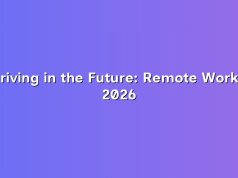A Decade Away—Or Already Knocking?
For decades, Artificial General Intelligence (AGI) was the stuff of science fiction: machines that could understand, learn, and reason across any domain as well as—or better than—humans. Now, many AI leaders predict it could be here within the next 5–10 years. If they’re right, we’re not just looking at smarter chatbots or better automation. We’re talking about an intelligence capable of managing businesses, designing technology, conducting research, and solving problems in ways indistinguishable from the best human minds.
That’s not a software update—it’s an economic earthquake. And one possible aftershock is the most radical societal shift since the Industrial Revolution: the idea that work, as we’ve known it for centuries, might become optional.
From Labor as Survival to Labor as Choice
For most of human history, work has been tied to survival. You farm, you eat. You labor, you earn wages, you buy food and shelter. Even in the modern knowledge economy, income remains the bridge between our skills and our basic needs.
AGI threatens to rewire that bridge. If machines can produce goods, services, and intellectual output with minimal human oversight, the link between human labor and economic output begins to weaken. Imagine a society where a large share of GDP is generated by autonomous AI systems working around the clock at near-zero marginal cost. In such a scenario, human labor becomes a matter of preference, not necessity.
Economic Systems Under Pressure
Our current economic frameworks—capitalism, taxation, welfare—are built on the assumption that people earn income primarily through work. AGI disrupts this by shifting value creation from human hands and minds to autonomous systems. This raises complex questions:
- Who owns the output of AGI?
If a machine designs a new drug, does the profit go to the company that owns the AI, the data providers, or to society at large? - How do we distribute wealth in a low-labor economy?
If fewer people are working, traditional wage-based income flows could collapse, forcing a rethink of tax bases, pensions, and social safety nets. - Will markets still function the same way?
If abundance drives the cost of goods and services toward zero, entire industries could shift from scarcity pricing to access-based or experience-based models.
The Labor Market in an AGI Era
If AGI takes on most productive work, traditional job categories will shrink dramatically. Some predictions suggest that creative, strategic, and emotional labor will hold out longer, but even those may be augmented—or outperformed—by AGI eventually.
We could see a tiered labor market emerge:
- Optional work: Creative projects, passion pursuits, and crafts people engage in for meaning rather than necessity.
- Hybrid work: Roles where humans collaborate with AGI for oversight, ethics, or high-stakes decision-making.
- Prestige work: Positions valued more for social or cultural capital than for economic productivity—think political leadership, elite sports, or art.
Redefining the Concept of a Career
In a post-AGI world, a “career” may look less like a linear climb through one profession and more like a series of self-directed projects or roles chosen for personal fulfillment. Without the pressure to “earn a living,” career planning could shift toward questions like:
- What challenges interest me most?
- What kind of impact do I want to make?
- How can I combine learning, creativity, and contribution into my life?
Work-life balance could flip into life-work integration, with work serving as a form of identity, community, or creative outlet rather than the centerpiece of survival.
The Psychological Shift: Meaning Beyond Work
Here’s the paradox: while people dream of financial independence and early retirement, many find identity, purpose, and social connection through their jobs. Remove the necessity to work, and society faces a psychological gap.
We’ve seen smaller versions of this already—retirees struggling with loss of structure, or lottery winners facing unexpected loneliness. The challenge will be to create new systems that help people find meaning, connection, and achievement outside of traditional employment.
Preparing for the Transition
If AGI truly is less than a decade away, preparation isn’t just a thought experiment—it’s urgent. Here are five key areas to focus on:
1. Policy and Governance
We need frameworks for ownership, accountability, and benefit-sharing. This might include universal basic income (UBI), AGI profit taxes, or public ownership of certain AI systems to ensure benefits are distributed widely.
2. Education and Skills
Learning won’t stop—it will shift. Instead of training for a single job, education may focus on critical thinking, ethics, creativity, and adaptability. Skills like collaboration, storytelling, and systems thinking could remain uniquely human advantages longer than technical skills alone.
3. Cultural Reinvention
Society will need new markers of achievement and contribution. We may see a rise in community-led projects, citizen science, and volunteer networks, where people invest their time in causes and creations rather than corporate outputs.
4. Ethical and Social Inclusion
If AGI-driven abundance only benefits a small elite, social instability will follow. Inclusive policy design is not just moral—it’s pragmatic. We’ll need to actively prevent “AGI feudalism” where ownership of AI systems determines who thrives.
5. Psychological Readiness
Governments, communities, and individuals will need to explore how to support mental well-being in a world where purpose isn’t tied to employment. This could mean encouraging hobbies, peer networks, and public service as pillars of identity.
Potential Pitfalls to Watch For
- Technological unemployment before safety nets are ready
If AGI adoption outpaces policy reform, millions could face income loss without a viable alternative. - Concentration of power
If AGI capabilities remain in the hands of a few corporations or governments, inequality could deepen dramatically. - Loss of skill relevance
If humans disengage from productive work entirely, future generations might lose competencies needed for resilience in case of AI failure or misuse. - Ethical drift
Without strong governance, AGI’s goals could drift from human values—especially if it’s optimizing for efficiency over human welfare.
The Optimistic View
Done right, AGI could enable humanity’s most ambitious goals: ending poverty, curing diseases, reversing environmental damage, and unlocking unprecedented creativity. In this vision, humans aren’t replaced so much as liberated—able to choose when and how to work, with material needs met as a baseline.
Imagine an economy where the currency isn’t just money, but ideas, experiences, and contributions to shared human advancement. AGI could be the lever that finally shifts us from an economy of scarcity to one of shared abundance.
The Real Question
The real debate isn’t whether AGI will arrive—it’s how ready we’ll be when it does. If we treat it like just another productivity tool, we’ll miss the systemic changes it demands. If we start planning now—for policy, for cultural adaptation, for psychological readiness—we can make the leap from a world where work is necessary to one where it’s truly optional, without leaving people adrift.
The next decade could determine whether AGI becomes the greatest equalizer in history—or the deepest divider.




























